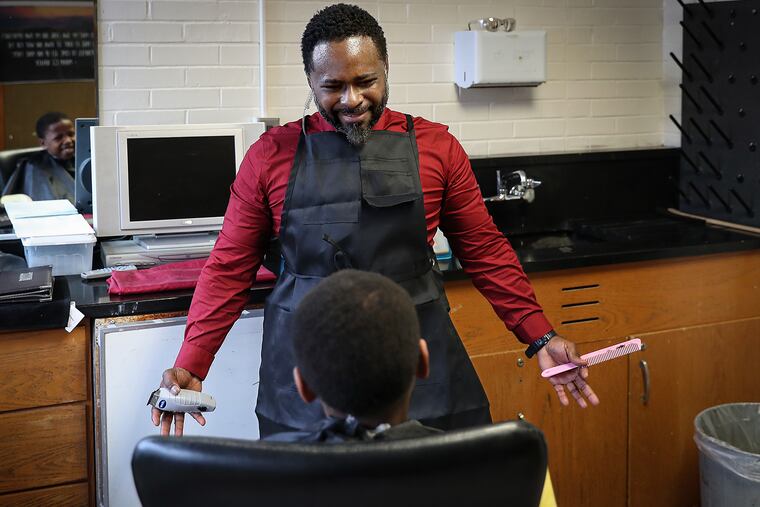This elementary school principal will do anything for his students, including cutting their hair | Jenice Armstrong
At a time when authorities nationwide are searching for ways to reach at-risk students, Terrance Newton has found a novel way to connect with his young male students. Warner Elementary's barbershop cost next to nothing. Most of the supplies are donated. Others Newton purchased himself.

We don’t pay educators nearly enough.
Nor do we reward them appropriately for all they do — all of the extra hours they put in, the money they shell out to buy supplies for students.
The ones I know give so much more than they get back.
» READ MORE: With salaries capped at $30K, Philly’s classroom aides are demanding more
So, I wasn’t really surprised when I read a blog post about the barbershop set up by Terrance Newton, the principal at Emalea P. Warner Elementary School in Wilmington. He not only created it — he’s also the barber. The shop is equipped with an adjustable styling chair, a wall mirror, a sink, and a variety of clippers and other barber supplies. Some days, a half-dozen boys sit on metal folding chairs in the makeshift area, waiting for a haircut.
At a time when authorities nationwide struggle to reach disadvantaged, at-risk students, Newton has established a novel way to connect with his young male charges. And it costs next to nothing. Most supplies were donated. Others Newton purchased himself.
As he wields his clippers, Newton talks to each boy, asking him what he is reading and dispensing advice. He believes, “When you look good, you feel good, you act good.”
What the principal is doing is huge because barbershops hold a special significance in urban communities. They’re sacred places where African American men relax and catch up on the latest news and gossip while getting groomed. Barbers are like confessors, hearing clients’ deepest secrets.
Warner school officials have discovered that the prospect of getting a fresh haircut goes a long way toward incentivizing good behavior. Suspensions reportedly are way down at the school — from 60 this time a year ago to four.
“I tell them: ‘You want your hair cut? I need you to do right in school,’ ” said Newton, a self-taught barber and veteran educator who created the shop after becoming principal in September.
On Tuesday, I watched 8-year-old Michael Harley climb into the barber chair. He sat quietly as Newton, who had traded his suit jacket for a black apron, applied a paper neck strip and covered Michael’s tiny body with a voluminous black cape. Using a large Afro pick, he gently combed through the boy’s hair, quietly saying, “I want you to start combing your hair every day, OK, little buddy?”
Newton used electric clippers to cut the boy’s hair. Then, he neatly trimmed the edges, applied Sea Breeze, and handed the boy a mirror. His smile showed he more than approved.
“I always look for nontraditional ways to connect with our students, and I think [the barbershop] is one of those means,” said Dorrell Green, superintendent of the Red Clay Consolidated School District. “We can do storytelling. We can actually mentor. We can sit down in a calm environment. It also helps with the self-esteem of our young men as they receive a haircut from their principal.”
» READ MORE: Black teachers matter. How do we get more in the classroom? | Opinion
Since Delaware Online published a story about the barbershop earlier this month, Newton began getting inundated with media requests. Producers at NBC’s The Kelly Clarkson Show and also from Fox 29 have reached out. Newton’s not sure what to make of all the attention.
“I’m not doing it for the fame,” Newton told me. “The seed I wanted to plant was building a relationship with my students.”
That seed is planted deep. I know from having watched how former students responded to my father, who taught for 45 years. They used to flock to him as if he were their hero. I’ll never forget how they would show up at our front doorstep asking for “Coach Armstrong.” Whenever we went anywhere, they would come running. These men — often they looked older than he did — never forgot the lessons, especially the important ones about life, that he taught them.
Just as the boys at Warner will never forget what their principal did for them, one haircut at a time.